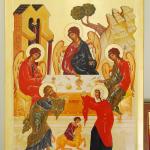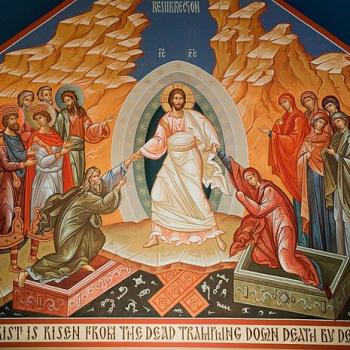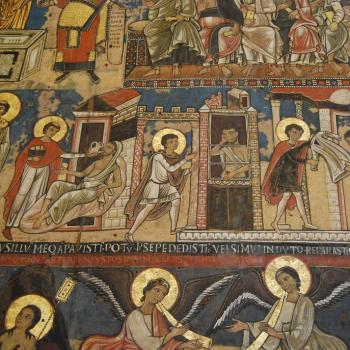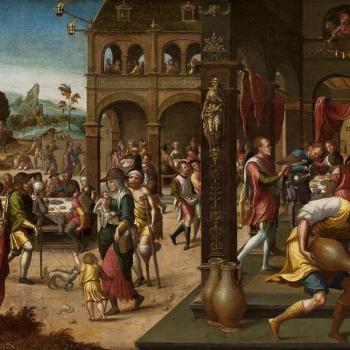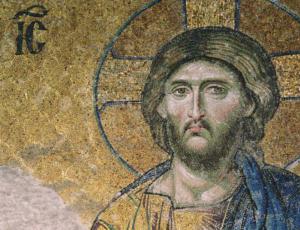
One of the dangerous tendencies or temptations those who study theology have to overcome is the suggestion that exhaustive theological knowledge is necessary for salvation. A comprehensive understanding of the faith is impossible. Thus, to require it for our salvation would make salvation impossible. The absolute truth of the Christian faith is the truth of God, and only God can comprehend God. “Rather, none know God with innermost knowledge save God.”[1] It is dangerous to impose some sort of theological understanding as being necessary for one to be Christian, because it is not our understanding which saves us, it is Christ. And, as St. Augustine realized, if Christ only saves those who possess comprehensive knowledge and understanding of the faith, then we are in trouble. “For, if Christ died for those only who are able to discern these truths with such understanding, our labor in the Church is almost worthless.”[2]
If we must comprehend revelation and all that is revealed through it, we will find ourselves given an impossible task to perform; the more we study and engage it, the more we will find what we do not know and understand of it. For the fullness of the truth is revealed through Christ, and the more we grasp after and apprehend it, the greater we will realize that truth actually is, and how much it is beyond our comprehension. This is why, for example, the sacraments do not require comprehension for their reception. If such a requirement were necessary, no one would ever be ready to receive them. And so those who would deny infant baptism, confirmation, and communion, because they say infants do not know or comprehend what it is they are receiving, would end up denying everyone the sacraments because no one comprehends them. The sacraments are great mysteries; while we can apprehend some of the truth revealed through them, their reality connects us with God and with the transcendent order which goes beyond our comprehension. The graces given in the sacrament does not require knowledge, though as one grows spiritually, one will hopefully grow in understanding and appreciation of what it is they received. While salvation is not connected to knowledge, our faith should motivate us, so as to seek to learn and apprehend more and more of the truth for ourselves. But if we ever think we have learned and understood everything we will be in trouble, because then we will not be open to learning more, which, as St. John Chrysostom said, would be a sad thing indeed:
Where are those who say they have attained and possess the fullness of knowledge? The fact is that they have really fallen into the deepest ignorance. For people who say that they have attained the totality of knowledge in the present life are only depriving themselves of perfect knowledge for the life hereafter. As for me, I say that my knowledge is imperfect and incomplete. And if I say that this knowledge will pass away, I am advancing on the road to a better and more perfect state. There, the partial knowledge becomes a more perfect knowledge once what was partial and imperfect has passed away.[3]
We cannot, and will not, have comprehensive knowledge and understanding of the absolute truth. Nonetheless, instead of seeing this as a detriment, we should realize how great this is, because it means we will never be bored with the truth. There will always be something more, something greater for us to realize, something more wonderful, more awe-inspiring for his to contemplate and apprehend. The fact that we are constantly growing in our knowledge and understanding, seeing past the mistakes we have made in the past, should also help us understand better what we see happening in salvation history and the way Scripture demonstrates the way humanity has grown in its understanding of God. God is unchanging, but we are changing. God is unchanging, but we are growing, and through that growth, we not only better understand what God does and does not want, but we also understand better the means by which we should do what God wants. The history of Israel represents this well; we see many things which were said and done in Scripture which we might question today, questions which might make us wonder how authentic, how holy such texts are. They are, however, holy, because they show a real synergy between the people of Israel with God, a synergy which allowed the people of Israel to grow in knowledge and understanding about God.
Salvation, though it does not require specific knowledge, is not unconnected with it; the more we open ourselves to God’s grace in our lives, the more we will learn from it, the more we will grow from it, so hopefully, the greater our knowledge and comprehension of the truth will be. If we try to stop our growth, if we think some level of knowledge and understanding represents the culmination of the truth, and so, if we reify that element of the truth and absolutize it, we risk cutting ourselves from further grace as we become attached to a representation of the truth over the truth itself. That is why heresies can be dangerous, because they point us to some limited truth instead of the fullness of the truth. We need the transcendent truth, not that which is merely limited; we can apprehend the transcendent and speak of it, but we must make sure we do so in such a way we do not cut ourselves from transcendence and the grace which lies beyond what we already have. The more we grow, the more we will desire to know; this, in itself, is good, for it can keep us open to the transcendent truth of God and all the grace which God continues to offer is. But it is also where we find ourselves in danger, as the more knowledge and understanding we have attained, the more find ourselves tempted to believe we finally have attained the ultimate truth, a temptation which we should never give into. We must be humble, also recognizing our own limitation, and when we do so, we can then understand others, and their own progression; we can walk with them, not expecting them to know or understand what we know or understand and yet recognize, if they are open to the transcendent, God can and will work with them, giving them the grace they need to grow.
[1] Al-Ghazālī, The Niche of Lights. Trans. David Buchman (Provo, UT: Brigham Young University Press, 1998), 17.
[2] St. Augustine, “Letter 169 Evodius” in Letters 165 – 203. Trans. Wilfrid Parsons, SND (New York: Fathers of the Church, 1955), 53.
[3] St. John Chrysostom, On the Incomprehensible Nature of God. Trans. Paul W. Harkins (Washington, DC: CUA Press, 1982), 58 [Homily 1].
Stay in touch! Like A Little Bit of Nothing on Facebook.
If you liked what you read, please consider sharing it with your friends and family!



